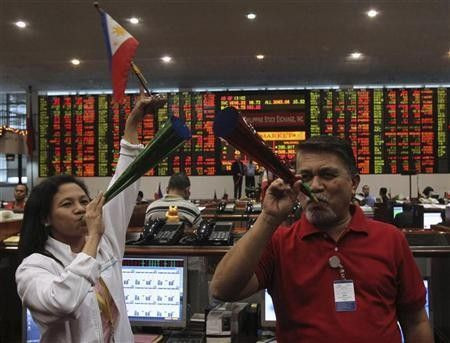Asian Stocks Mixed As Japan Data, US Earnings Weigh

Asian stock markets were mixed Monday as sentiment was weighed down by the sluggish Japanese trade data and the disappointing U.S. earrings.
Chinese Shanghai Composite advanced 0.21 percent or 4.46 points to 2,132.76 and Hong Kong's Hang Seng gained 0.37 percent or 78.80 points to 21,630.56. Japanese Nikkei ended flat while South Korea’s KOSPI Composite declined 0.12 percent and Taiwan’s Taiex Index declined 0.48 percent.
Markets opened on a negative note as sentiment turned negative Friday in the U.S. trading following a slew of weak corporate earnings reports. The U.S. stocks Friday suffered their worst single-day decline since June as Dow components General Electric and McDonald's missed estimates, adding to a disappointing earnings season.
Of the 116 S&P 500 companies that have reported results so far in this earnings season, 60 percent have exceeded analysts' estimates. Just 38 percent of S&P 500 companies beat expectations on revenue in the past week, compared with the 41 percent since the start of the reporting period and well below the 62 percent long-term average, according to Thomson Reuters’ data. Earnings for S&P 500 components are expected to decline 1.8 percent from a year ago.
“Markets have had a pretty strong rebound already. The outlook for company earnings is being revised down and that’s affecting market sentiment. Any market correction is good and likely to be short-lived as investors will likely use any weakness as a buying opportunity. Even though earnings are slowing, they’re not collapsing,” Nader Naeimi, Sydney-based head of dynamic asset allocation at AMP Capital Investors Ltd. which manages almost $100 billion, told Bloomberg.
Meanwhile, the official data Monday showed that Japan recorded trade deficit of 558.4 billion yen ($7 billion) in September compared to a surplus of 288.8 billion yen in the same period last year as exports tumbled at their sharpest pace since last year’s post-earthquake slump.
Exports dropped 10.3 percent in September from a year earlier, indicating the soft global demand. Exports to China tumbled 14.1 percent from a year earlier, the biggest decline since January and worse than a 9.9 percent drop in the prior month as demand for Japanese-branded products declined following a territorial spat with China.
Automobile exports to China slumped 44.5 percent as the relationship between China and Japan took a bad turn after Tokyo in September said that it would buy the East China Sea islands claimed by both countries.
Japanese shares pared earlier losses and ended flat as the dollar’s strength against the yen supported exporters. NEC Corp. gained 2.19 percent and Sharp Corp. climbed 7.38 percent while Komatsu Ltd. plunged 2.40 percent.
In Hong Kong, Greentown China Holding Ltd. climbed 6.85 percent and Longfor Properties Co Ltd. gained 0.93 percent while PetroChina Co Ltd. fell 1.62 percent and Aluminum Corp. of China Ltd. declined 1.39 percent.
In Seoul, LG Electronics Inc. fell 0.95 percent and Hyundai Motor Co. declined 0.88 percent while Samsung Electronics Co Ltd. gained 1 percent.
© Copyright IBTimes 2024. All rights reserved.





















